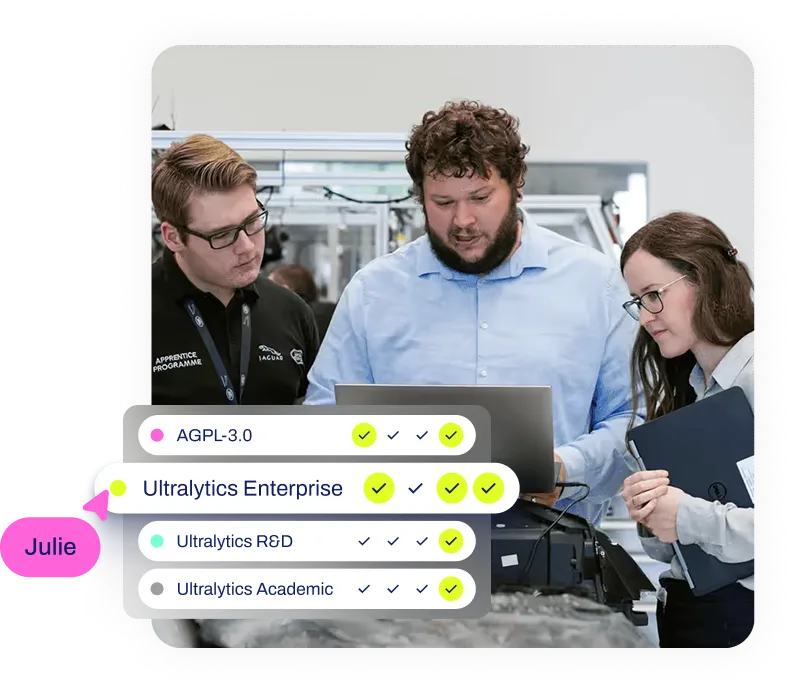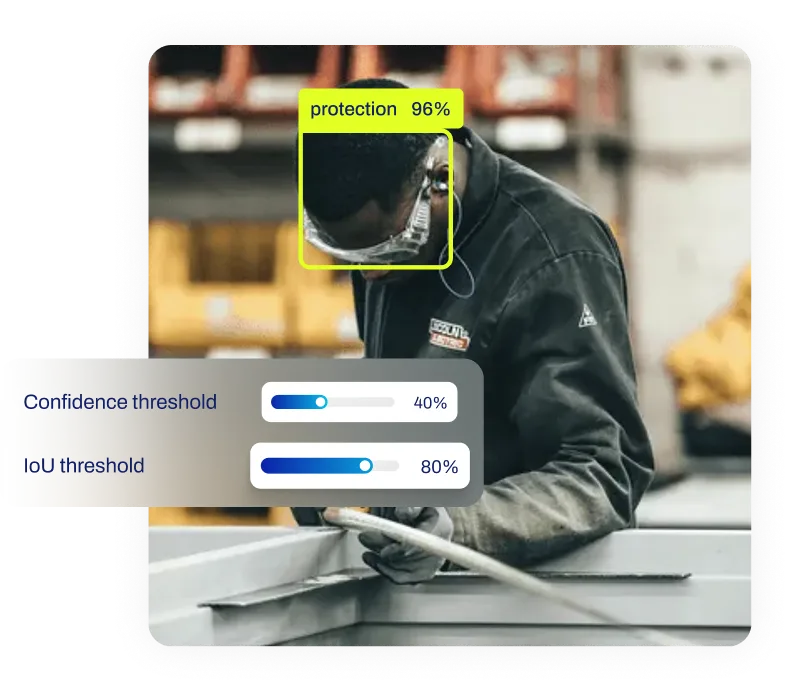Künstliche Intelligenz (KI)
Entdecken Sie die Grundlagen der künstlichen Intelligenz, vom maschinellen Lernen bis zum Deep Learning. Erfahren Sie, wie Ultralytics moderne KI und Computer Vision unterstützt.
Künstliche Intelligenz (KI) ist ein weites Feld der Informatik, das sich mit der Entwicklung von Systemen befasst, die
Aufgaben ausführen können, für die traditionell menschliche Kognition erforderlich ist. Diese Aufgaben reichen von der Spracherkennung und der Interpretation visueller
Daten bis hin zur Entscheidungsfindung und Sprachübersetzung. Im Kern versucht KI, menschliche Intelligenzprozesse zu simulieren, indem sie
Maschinen in die Lage versetzt, aus Erfahrungen zu lernen, sich an neue Eingaben anzupassen und menschenähnliche Aufgaben auszuführen. Moderne Fortschritte
haben den Fokus von einfachen regelbasierten Systemen auf ausgefeilte
datengesteuerte Ansätze verlagert, die es Software ermöglichen,
sich im Laufe der Zeit autonom zu verbessern. Heute dient KI als Grundlage für transformative Technologien wie
autonome Fahrzeuge und intelligente virtuelle
Assistenten und verändert damit die Arbeitsweise von Branchen weltweit.
Die Hierarchie: KI, maschinelles Lernen und Deep Learning
Um die Landschaft vollständig zu erfassen, ist es hilfreich, sich diese Konzepte als verschachtelte Schichten vorzustellen.
Künstliche Intelligenz ist die übergeordnete Disziplin. Innerhalb dieser breiten Kategorie liegt
maschinelles Lernen (ML), eine Untergruppe, die sich auf
Algorithmen konzentriert, die Muster aus Daten lernen, anstatt für jede spezifische Regel explizit programmiert zu werden. Eine Vertiefung
dieser Spezialisierung ist Deep Learning (DL), das
mehrschichtige neuronale Netze (NN) einsetzt, um
komplexe Muster in riesigen Datensätzen zu modellieren. Während ein einfaches Schachprogramm als KI betrachtet werden kann, nutzen moderne Kraftpakete
wie YOLO26 Deep-Learning-Architekturen, um
bei komplexen visuellen Aufgaben eine Leistung auf dem neuesten Stand der Technik zu erzielen.
Arten von AI: Eng gefasst vs. allgemein
Die meisten heute verwendeten KI-Anwendungen fallen unter die Kategorie der
künstlichen engen Intelligenz (Artificial Narrow Intelligence, ANI), die manchmal auch als schwache KI bezeichnet wird. Diese Systeme sind
darauf ausgelegt, bestimmte, genau definierte Aufgaben – wie die Empfehlung von Produkten, die Erkennung von Kreditkartenbetrug oder die
Analyse medizinischer Bilder – hervorragend zu bewältigen und übertreffen in diesem begrenzten Rahmen oft die Geschwindigkeit und Genauigkeit des Menschen.
Im Gegensatz dazu
stellt die künstliche allgemeine Intelligenz (AGI) oder starke KI einen theoretischen Zukunftszustand dar,
in dem eine Maschine die Fähigkeit besitzt, Wissen zu verstehen, zu lernen und auf eine Vielzahl von Aufgaben anzuwenden,
wobei sie eine kognitive Flexibilität zeigt, die von der eines Menschen nicht zu unterscheiden ist. Forschungsorganisationen und
akademische Einrichtungen weltweit erforschen weiterhin den Weg zu diesen allgemeineren
Systemen, obwohl die aktuelle Technologie nach wie vor fest im Bereich der ANI verankert ist.
Anwendungen und Anwendungsfälle aus der Praxis
Der praktische Nutzen der KI erstreckt sich auf nahezu alle Branchen. Zwei prominente Beispiele veranschaulichen ihre Auswirkungen:
-
Computer Vision im Gesundheitswesen: KI-Modelle revolutionieren die Diagnostik, indem sie Röntgenbilder und
MRT-Aufnahmen analysieren, um Anomalien mit hoher Präzision zu identifizieren. Beispielsweise können
Objekterkennungsalgorithmen Tumore
oder Frakturen lokalisieren und fungieren so als zweites Paar Augen für Radiologen. Diese Anwendung der
medizinischen Bildanalyse beschleunigt die Diagnose erheblich
und verbessert die Behandlungsergebnisse für Patienten.
-
Generative KI für die Erstellung von Inhalten: Jüngste Durchbrüche in der
generativen KI ermöglichen es Maschinen, neue Inhalte zu erstellen,
darunter Texte, Bilder und Code.
Große Sprachmodelle (LLM) versorgen
Chatbots, die E-Mails entwerfen oder Dokumente zusammenfassen können, während Bildgenerierungstools kreative Arbeitsabläufe in
Marketing und Design optimieren.
Implementierung von KI mit Python
Entwickler können KI-Funktionen mithilfe von High-Level-Bibliotheken einfach in ihre Software integrieren. Das folgende Beispiel
zeigt, wie das Ultralytics verwendet wird, um
Objekterkennung in einem Bild durchzuführen. Dies veranschaulicht, wie einfach die Ausführung von
Inferenzen mit vortrainierten Modellen ist.
from ultralytics import YOLO
# Load the YOLO26n model, optimized for speed and accuracy
model = YOLO("yolo26n.pt")
# Perform object detection on a sample image URL
results = model("https://ultralytics.com/images/bus.jpg")
# Display the detection results (bounding boxes and labels)
results[0].show()
Daten und Ethik in der KI-Entwicklung
Der Erfolg eines KI-Systems hängt in hohem Maße von der Qualität seiner
Trainingsdaten ab. Mit Tools wie der
Ultralytics können Teams
Datenannotationen und Trainingsworkflows verwalten, um sicherzustellen, dass
ihre Datensätze robust und repräsentativ sind. Die Abhängigkeit von Daten bringt jedoch Herausforderungen hinsichtlich
algorithmischer Verzerrungen mit sich. Wenn die Eingabedaten
historische Vorurteile enthalten, kann das KI-Modell diese reproduzieren oder verstärken. Infolgedessen hat der Bereich der
KI-Ethik und
KI-Sicherheit an Bedeutung gewonnen, wobei der Schwerpunkt auf der Entwicklung von
Transparenz in der KI und der Gewährleistung eines fairen und zuverlässigen Betriebs der Systeme liegt
. Organisationen wie NIST bieten
Rahmenwerke, um diese Risiken effektiv zu bewältigen.
Zukünftiger Ausblick
Mit zunehmender Rechenleistung durch spezialisierte Hardware wie
GPUs und
TPUs werden KI-Modelle immer
effizienter und leistungsfähiger. Konzepte wie Edge-KI verlagern die
Intelligenz direkt auf die Geräte, wodurch die
Inferenzlatenz und die Abhängigkeit von Cloud-Verbindungen
reduziert werden. Ob durch die Weiterentwicklung der Robotik oder die
Verbesserung der Vorhersagemodelle im Finanzwesen – KI
ist nach wie vor eine treibende Kraft für Innovationen.










.webp)